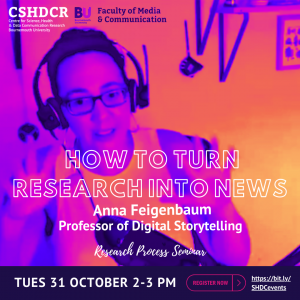Join us on 31 October 2023 | 14:00-15:00

Whether explaining scientific details, introducing concepts from postcolonial politics or quoting archival texts, turning research into news is often a challenge. In this research process seminar Professor of Digital Storytelling, Anna Feigenbaum, introduces her process for identifying ‘infobites’ and tailoring them for an intended audience to maximise the reach and impact of your academic research. She also offers tips on ‘what not to wear’ and how to deal with journalists’ questions that you don’t want to answer. This seminar draws from Prof Feigenbaum’s extensive experience working with media outlets ranging from Vice News to the BBC, from Elle magazine to Business Insider. At the end of this seminar, you will know:
- How to identify ‘infobites’ that target a specific outlet and audience
- How to deal with difficult questions
- How to link research to impact via engagement with the media
Professor Anna Feigenbaum is an internationally known expert and innovator in the field of data storytelling. Her projects have been funded by UKRI, the Wellcome Trust, British Academy, the US Embassy, and the United Nations. Her research has informed journalistic reporting, NGO strategy including a Webby Award-winning data storytelling project, multiple web-comics, and museum exhibitions at the V&A, Barbican and The Whitney. She has led digital storytelling and media trainings with the NHS, NGOs and universities around the world. Prof Feigenbaum’s work reaches wide audiences through public engagement and media activities including the British Science Festival, The Conversation, The Guardian, The Financial Times, BBC Radio 3 and Radio 4.
 Are you interested in developing the real-world impact of your research? How about increasing your public profile? If you’ve answered yes to any one of those questions, then the Research Communication Day is for you.
Are you interested in developing the real-world impact of your research? How about increasing your public profile? If you’ve answered yes to any one of those questions, then the Research Communication Day is for you. ESRC offer ESRC-funded researchers a one-day media training session that provides the opportunity to develop practical media skills in a safe environment.
ESRC offer ESRC-funded researchers a one-day media training session that provides the opportunity to develop practical media skills in a safe environment.

 Following on from the recent AHRC/Radio 3 New Generation Thinkers pilot scheme and the over-subscribed AHRC Broadcast Media workshops , the
Following on from the recent AHRC/Radio 3 New Generation Thinkers pilot scheme and the over-subscribed AHRC Broadcast Media workshops , the 










 Second NIHR MIHERC meeting in Bournemouth this week
Second NIHR MIHERC meeting in Bournemouth this week Dr. Ashraf cited on ‘Modest Fashion’ in The Guardian
Dr. Ashraf cited on ‘Modest Fashion’ in The Guardian NIHR-funded research launches website
NIHR-funded research launches website MSCA Postdoctoral Fellowships 2025 Call
MSCA Postdoctoral Fellowships 2025 Call ERC Advanced Grant 2025 Webinar
ERC Advanced Grant 2025 Webinar Horizon Europe Work Programme 2025 Published
Horizon Europe Work Programme 2025 Published Horizon Europe 2025 Work Programme pre-Published
Horizon Europe 2025 Work Programme pre-Published Update on UKRO services
Update on UKRO services European research project exploring use of ‘virtual twins’ to better manage metabolic associated fatty liver disease
European research project exploring use of ‘virtual twins’ to better manage metabolic associated fatty liver disease